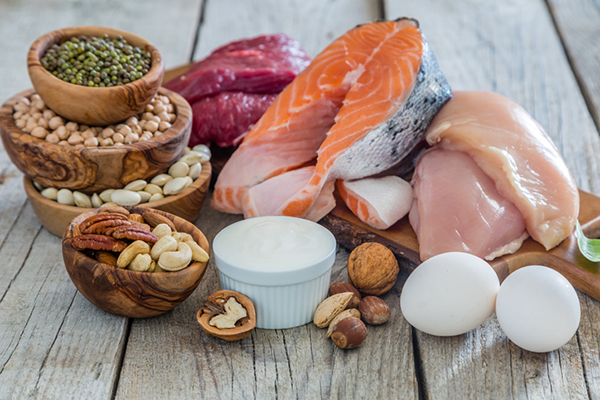Everything You Need to Know About Amino Acids

You likely already know about the importance of protein.
This macronutrient helps your body metabolize and digest food, repair your body tissues (including muscles), and grow and develop in a healthy way.
But in order for those things to happen, your body needs to break down protein into its building blocks, called amino acids.
Amino acids are divided into three categories:
- Essential (or indispensable)
- Non-essential (or dispensable)
- Conditional (or conditionally indispensable)
While you usually get all the amino acids you need from food, they’re also available in supplement form.
Here’s a quick guide to amino acids, including the nine that you can only get through your diet — and which foods provide them.
What Do Amino Acids Do in the Body?

Amino acids play some starring roles within your body. These include:*
- Breaking down food
- Growth and development
- Tissue repair
- Muscle growth and repair
- Providing energy
While hundreds of amino acids exist, we only use about 20.
What Amino Acids Are Essential and Non-Essential?
“About half of amino acids are deemed essential,” says dietitian Natalie Allen, RD, MS, team dietitian Missouri State University. “Essential amino acids must be consumed through the diet; the body cannot make them.”
Essential amino acids
The nine essential amino acids are:
- Gistidine
- Isoleucine
- Leucine
- Lysine
- Methionine
- Phenylalanine
- Threonine
- Tryptophan
- Valine
Non-essential amino acids
Non-essential amino acids are those that your body will produce whether you get them from the food you eat or not.
They include alanine, arginine, asparagine, aspartic acid, cysteine, glutamic acid, glutamine, glycine, proline, serine, and tyrosine.
Conditional amino acids
Conditional amino acids are essential only when you’re stressed or sick.
This group includes arginine, cysteine, glutamine, tyrosine, glycine, ornithine, proline, and serine.
The Benefits of BCAAS
Leucine, isoleucine, and valine are a trio of essential amino acids known as BCAAs (branched-chain amino acids).
The name comes from their chemical structures, and these three work together in unique ways. Usually, amino acids need your liver to break them down before you can use them.
However, BCAAs don’t need to “wait in line” before your muscles can use them.
“Research shows that BCAAs play an important role in muscle repair and growth,” says Trevor Thieme, C.S.C.S. They’re included in Beachbody Recover “to help kick-start the recovery process,” he explains.*
BCAAs may also help you maintain muscle mass, uniquely fuel your working muscles, and support muscle protein synthesis and muscle repair.*
What Foods Sources Have Amino Acids?

If you’re eating enough protein, you’re likely getting enough amino acids, explains Allen.
Food sources that provide that essential macro also provide at least some of the amino acids you need.
“Eating a variety of protein-rich foods will help ensure you are getting a balance of amino acids,” she says. “Meat is generally the best source of protein and amino acids. All meat items provide protein and (hence) amino acids. Vegetarian sources of amino acids include eggs, nuts, dairy foods, and beans.”
Foods that are complete proteins (usually animal sources) provide all essential amino acids.
Those that are incomplete (often plant sources) either don’t provide them all or don’t offer high enough amounts of certain essential amino acids.
Complete proteins
- Meat, poultry, and seafood
- Eggs
- Dairy
- Soy
Incomplete proteins
- Legumes (beans, peas, and lentils)
- Seeds
- Nuts
- Vegetables
- Whole grains
Amino Acid Chart
This handy amino acid chart shows you which ones are essential and which are non-essential amino acids. (° denotes conditional amino acids.)
| Amino Acid | Essential or Non-Essential |
| Arginine° | Non-essential |
| Cysteine° | Non-essential |
| Glutamine° | Non-essential |
| Glycine° | Non-essential |
| Histidine | Non-essential |
| Isoleucine | Essential (BCAA) |
| Leucine | Essential (BCAA) |
| Lysine | Essential |
| Methionine | Essential |
| Ornithine | Non-essential |
| Phenylalanine | Essential |
| Proline° | Non-essential |
| Serine° | Non-essential |
| Threonine | Essential |
| Tryptophan | Essential |
| Tyrosine° | Non-essential |
| Valine | Essential |
*These statements have not been evaluated by the Food and Drug Administration. This product is not intended to diagnose, treat, cure, or prevent any disease.
